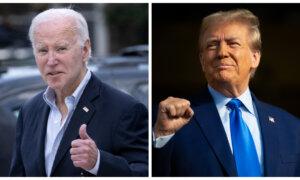With Donald Trump’s 2024 primaries sweep making a rematch with the incumbent President Joe Biden more inevitable in the November elections, Wall Street and China analysts are already assessing the former president’s potential return to the White House and charting their probable reactions.
A few investors have started playing the odds to see who will win, although there are many variables to consider while predicting the impact of the 2024 U.S. presidential election on the stock market, bond yield, and currency exchange rate. The majority of investors also believe that, in the long run, market factors including Federal Reserve policy, the business cycle, and corporate profits will be more important.
Yet, the U.S. elections are attracting significant attention among analysts given the unusually early clarity on the likely candidates, and the unusual matchup between a sitting president, Joe Biden, who is trailing in the polls, and the former president he defeated four years ago.
“The 2024 election could be a major market event given the policy differences between the likely candidates,” said Goldman Sachs, the multinational investment bank and financial services company, in a client note viewed by The Epoch Times. “While the experience of 2016 and 2020 suggests it may be too early for the election to have a major impact on markets, given that Trump and Biden are both well-known quantities, the election could impact markets earlier than in prior election years.”
The policy dynamics surrounding the 2024 U.S. elections are truly unique compared to other years. For one, a sitting president is trailing in the polls and a former president seeking reelection means that President Biden is more likely to implement measures that would benefit him, even if it means compromising on issues he would ordinarily oppose.
But if the White House becomes open to big policy concessions as a result of the incumbent presidents, Republican lawmakers may seem less inclined to announce new policy measures, which, along with his significant wins in Iowa and New Hampshire, could provide Donald Trump clout among Republicans, noted Goldman Sachs.
According to the investment bank, while the election’s policy ramifications are clear, it’s unclear what issues the candidates will focus on in the lead-up to the election. For instance, on economic policy, Donald Trump is expected to prioritize tax cuts, particularly for companies, but President Biden may attract support by suggesting benefits of expansion supported by increased taxes on businesses and the rich.
That aside, although Donald Trump is less likely to stress another key idea that might be divisive—a 10 percent tariff across the board—but if he does, it would give a clear signal that he intends to impose it if elected, Goldman Sachs adds.
Consequently, commented Goldman Sachs analyst Ben Snider in the note that while other macro and micro drivers, rather than politics, are more likely to move stocks in the coming months, some election-year equity market patterns are worth keeping in mind.
“First, equity returns have generally been modestly weaker than average in presidential election years. Second, earnings growth typically drives presidential election year returns. And third, election year returns tend to be even more fiscal policy, regulation, and global trade, though the election is back loaded than usual,” Mr. Snider wrote.
Split Control
Goldman Sachs is not an outlier in terming the November election unusual; “The coming election cycle will likely be one of the most interesting in recent memory as a highly polarized electorate takes to the polls on Nov. 5,” wrote Gennadiy Goldberg, head of U.S. rates strategy at the New York-headquartered TD Securities in a note on Jan. 30.
In addition, he expects that the Republicans might “recapture” the Senate and Donald Trump might be reelected president, but that “split control” may exist between the Senate and the House.
If former President Trump wins and succeeds in making his 2017 tax cuts permanent, reduced taxes may provide a wide lift to equities markets, while worries of a renewed trade war with China might offset some of those gains, according to Mr. Goldberg.
Tax cuts might also raise concerns about rising budget deficits and impact on Treasury bond prices by raising the term premium—a measure of the compensation investors want for owning long-term bonds, he noted.
Credit rating agency Fitch warned on Jan. 22 that it expects U.S. budget deficits to remain high this year, and that the fiscal policy and governance implications of the U.S. presidential elections will be critical to the country’s sovereign ratings.
Last year, Fitch lowered the U.S. government’s highest credit rating from AAA to AA+, citing budgetary deterioration and repeated last-minute debt ceiling discussions.
Hence, while the fair value of 10-year Treasury at around 3.5 percent, according to Mr. Goldberg, a sharp upswing in deficits and softer economic landing could ultimately keep rates elevated.
Similarly, “expectations of sustained higher deficits could slow any widening in [swap] spreads,” he wrote.
The swap spread is the difference between the fixed component of a swap and the yield on a government security with the same maturity, and it reflects market expectations and risk perceptions related to credit risk and liquidity.
Geopolitical Impact
The upcoming U.S. election could be a pivotal moment for U.S.-China ties as well, based on the fact that bilateral relations have been strained over the last several years.
“For China, the biggest uncertainty in 2024 is whether Donald Trump will return to power in the U.S.,” Raymond Yeung, chief economist, Greater China, ANZ, wrote in a client note, viewed by The Epoch Times, on Monday.
“We know that both Democrat and Republican parties will be tough in their stance towards China,” he added.
According to TDS Securities, as military relations between the two nations resumed, the Biden administration tried to repair U.S.-China ties. Still, tensions between China and Taiwan remain high with the election of the Democratic Progressive Party’s Lai Ching-te, possibly straining U.S.-China ties, too.
Donald Trump’s relationship with China has also been difficult, with numerous rounds of trade conflicts resulting in the imposition of fresh tariffs. Mr. Trump has already promised to enact far bigger and more sweeping tariffs than he did in his last term—a 60 percent tariff on Chinese goods, and a 10 percent tariff on all imported goods from all countries, if he returns as a president.
Help to Ukraine and Israel is also on the agenda, with President Biden advocating for greater help while Republicans would undoubtedly want to cut funding.
Nevertheless, “Given the significant differences in potential policy outcomes, one clear implication of the election is that volatility may be higher, and the distribution of outcomes will likely look wider,” concluded Goldman Sachs in its note.
Original News Source Link – Epoch Times
Running For Office? Conservative Campaign Consulting – Election Day Strategies!


